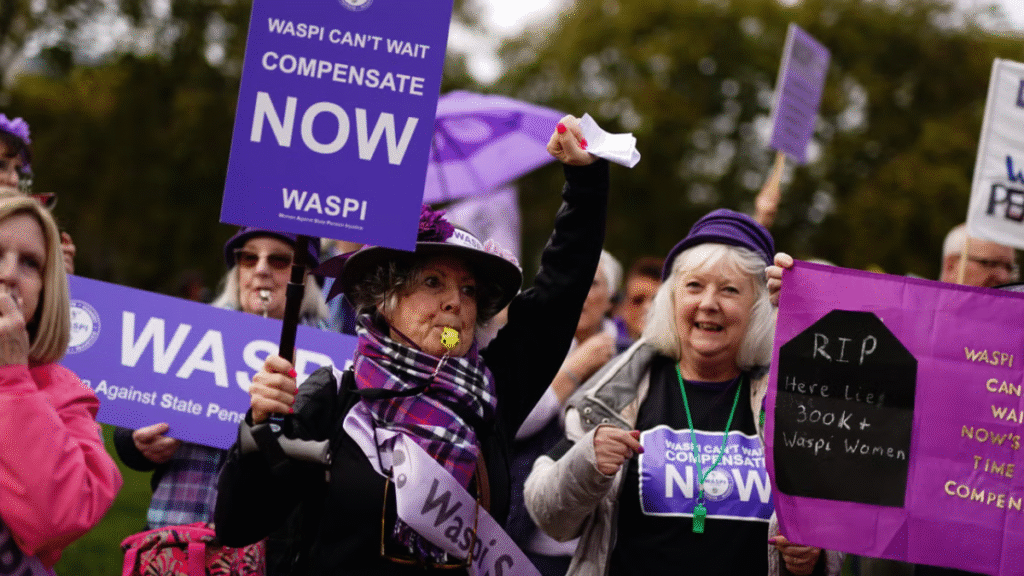For many British DWP women born in the 1950s, the state pension age turned out to be a day of confusion rather than celebration. You may have seen headlines about thousands of women still demanding up to £3,150 in compensation under the WASPI campaign—and for good reason. Even though it’s now June 2025, you could still feel the effects today. Here’s a deeper look at why this matters, what’s happening right now, and what you can do if you’re affected.
1. The Story Behind WASPI
It all began in 1995. The government passed an incremental increase to the state pension age for women, gracefully moving it from 60 to 65. Then, in 2011, the timetable sped up without proper warning. Suddenly, women born between June 6, 1950, and June 5, 1960, found themselves having to wait until their mid-sixties for a pension they’d planned for years.
Picture someone counting down to their 60th birthday as the end of long hours and low wages—only to discover they have to keep working two to five years longer. For many, this meant losing income, potential career change opportunities, or mortgage freedom.
2. The Formal Investigation—and a £3,150 Figure Emerges

In response, the Parliamentary and Health Service Ombudsman (PHSO) investigated and concluded that the Department for Work and Pensions (DWP) failed to properly inform women about these changes. In other words, they acknowledged it was maladministration.
The Ombudsman’s final report recommended compensation ranging from £1,000 to £2,950 per woman, depending on how severely each person was affected. With added pressure from some MPs and campaigners, that formal maximum figure became rounded up to approximately £3,150.
Yet, as of June 2025, the government has not approved or promised any of this money. Ministers argue that many women knew about the changes anyway, and that finding money to pay millions of people would be financially irresponsible. They’ve also suggested it’s too late to change things now.3. Who Could Get Paid (If It Ever Happens)
While nothing official is confirmed, here’s the likely eligibility if the campaign succeeds:
- Born between 6 June 1950 and 5 June 1960
- Received no meaningful communication about state pension age changes
- Suffered financial or emotional harm due to losing retirement income or extending work years
Many women in this group expected to retire at 60. Instead, they were told they had to work until 63, 65, or later—often without time or savings prepared for the extra years.
4. Real Financial Consequences
Take Susan, who was planning to retire exactly on her 60th birthday in 2015. She downsized her home and took early retirement leave at her job. Then she learned she had to keep working until 65. She ended up returning to work part-time in retail just to survive.
Or think of Mary, who had carefully saved for a quiet retirement. She counted on her pension to keep the tight family finances afloat. Forced to juggle longer work with caring for an aging parent, her savings dried up and her health deteriorated just trying to stay afloat.
These stories are repeated across towns and communities—and they reflect the very real impact of not knowing the rules until it was too late to plan.
5. What You Can Do Now
Even though there is no fund yet, you’re not powerless.
Stay Informed
Follow the official WASPI campaign website and check your local MP’s updates. New legal strategies are being developed all the time, and credible updates are shared through official channels.
Contact Your MP
Write or meet with your Member of Parliament. Let them know your house is now facing serious financial pressure because your retirement date was suddenly pushed back. Many MPs support reviewing the Ombudsman’s compensation proposals.
Join the Campaign
Add your voice. Sign petitions, attend rallies or webinars, and share your story. Campaigns gain strength from shared experiences, and your story could be the turning point.
Prepare for Legal Action
If the government refuses to act, WASPI may go to court. If so, women like you may be invited to submit a personal impact statement. Having it ready now—detailing how your life and finances changed—could be invaluable when that time comes.
6. What the Government Says — and Why It Still Matter

So far, the government has rejected the Ombudsman’s compensation recommendation. They say:
- Most women already knew about the changes
- It would be too expensive to pay retroactive compensation
- The changes were made lawfully
- Communication around them was publicly accessible online and via mail
However, the Ombudsman found the communication numbers were sparse and often sent too late. Senior women simply didn’t receive the guidance required. That omission has made all the difference in their financial lives today.
7. Possible Paths Ahead
There are a few scenarios that might bring a payoff:
- Legal Challenge – If campaigners take the government to court and win, compensation may still be ordered.
- Political Change – A future government might take up the cause and introduce policy change.
- Targeted Policy Shift – Without a universal payout, there may be an option for hardship grants or discretionary payments to the most affected.
This campaign isn’t over. More legal strategy and political debate is expected through late 2025 and into 2026.
8. Why It Still Matters
This story isn’t just about money. It’s about how policy can disrupt lives—and how good communication can make or break planning and security. It’s about women who set retirement targets, sold homes, and retired from full-time jobs—only to be told to keep working, often in poor health or with caregiving responsibilities. It’s a question of trust and fairness too.
9. Your Voice Counts Now
If you’re one of the women affected, here’s a short checklist:
- Write down the date you found out you would have to work longer than expected
- Gather any letters or documents you were sent—or not sent—by DWP
- Start telling your personal story; it matters
- Stay alert to campaign and legal updates
Your experience could help shape future justice.
Final Thoughts
Even in June 2025, for many women in their early seventies, the story of “you have to wait for your pension” is still unfolding. There are no official payouts yet—and unfortunately, none are promised—but that doesn’t mean your experience goes unheard or unrewarded. Staying informed, joining the WASPI campaign, and making your voice heard are all meaningful steps toward a fair resolution.
Time may test patience—but momentum is building. And that £3,150 isn’t just a number. It’s a symbol of lost years, rewritten retirements, and the long shadow of poor communication. If you feel it’s your turn for a bit of justice, don’t swear by silence.
FAQs
Q1. What is the £3,150 WASPI compensation?
A: The £3,150 payment is proposed compensation for women affected by the state pension age changes — known as the WASPI (Women Against State Pension Inequality) group. It aims to address financial hardship caused by insufficient notice of pension age increases.
Q2. Who are the WASPI women?
A: WASPI refers to women born between April 6, 1950, and April 5, 1960, who were affected by changes to the state pension age without being given adequate notice.
Q3. Who is eligible for the £3,150 compensation?
A: Women in the affected age group who suffered distress or financial loss due to lack of clear communication from the DWP about changes in their retirement age may be eligible. The final criteria are yet to be confirmed by the government.
Q4. Is the £3,150 payment confirmed?
A: The Parliamentary and Health Service Ombudsman (PHSO) has recommended compensation, but as of now, it is not officially confirmed. The government is still reviewing the final decision.
Q5. When will the WASPI compensation be paid?
A: Payment dates haven’t been officially announced. If approved, the timeline may extend into late 2025 or beyond, depending on government response and administrative rollout.


